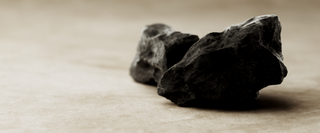From early remedies to modern medicine, coal tar has an impressively long and effective legacy. But what actually is coal tar, and why is it still used in medicine today?
Derived from coal, a naturally occurring substance that forms in the Earth’s surface over millions of years, coal tar is best known for its dark, sticky appearance and distinctive smoky smell. But despite its industrial origins, it’s packed with medicinal benefits – so much so, it’s been used for over a century to relieve uncomfortable skin and scalp conditions.
Rich in anti-inflammatory, antibacterial and anti-itch properties, coal tar is a trusted active ingredient for treating:
-
Psoriasis
-
Seborrheic dermatitis
-
Dandruff
-
Eczema
-
Itchiness and scaling
While the idea of using coal tar shampoo to cleanse a painful scalp might raise eyebrows in a world of advanced skincare, its effectiveness is undisputed, particularly in medicated treatments like Polytar Scalp Shampoo, which offers a simple yet effective solution to manage long-term scalp health. But how did coal tar become a key ingredient in scalp and skincare treatments? Let’s take a look at its history.
The origins of coal tar in medicine
Coal tar was first identified around 1665, but it wasn’t used for medical purposes until the 1800s. According to the scientific journal Clinical and Experimental Dermatology, coal tar has been used to treat skin conditions for decades, with one of the earliest documented uses reported in 1894.
During the rise of industrial coal processing in the 19th century, coal was burned to produce gas and coke, and a thick, sticky byproduct – coal tar – was collected. Coal tar was initially considered waste, but that changed when physicians began to notice that coal workers exposed to the substance rarely showed signs of common skin conditions.
By the late 1800s, coal tar had found its way into dermatology, and by the early 1900s, it became a standard treatment for scalp conditions, leading to the development of medicated coal tar shampoos such as Polytar.
What made coal tar special was its ability to work where other treatments failed. Despite its strong smell and appearance, it became a mainstay in clinical practice, often applied as ointments, creams or incorporated into bath products to help manage chronic skin conditions. Doctors found it particularly useful when patients didn't respond to conventional remedies, which led to widespread medical adoption throughout the 19th and early 20th centuries.
The rise, fall and rise again of coal tar
Coal tar became a go-to treatment for skin and scalp conditions in the mid-20th century. At the time, it was one of the few treatments available that actually worked for chronic symptoms.
But as medicine advanced, newer treatments like corticosteroids became more popular. They offered faster relief and came in pleasant formulations that didn’t have coal tar’s strong smell. Over time, coal tar fell out of favour.
However, despite decades of medical and pharmaceutical advances, coal tar continues to be a go-to choice for consumers looking for a proven, scientifically backed remedy.
That’s where products like Polytar Scalp Shampoo come in. With coal tar solution as the main ingredient, it delivers effective, lasting relief while proactively treating dandruff, scalp psoriasis and eczema.
The science behind coal tar and its smell
Coal tar may have humble origins, but its effects are rooted in complex chemistry. According to the Encyclopedia of Toxicology, coal tar is a complex hydrocarbon mixture produced when coal is heated at high temperatures.
In its natural form, coal tar is a thick, sticky, nearly black liquid with a strong, smoky smell. Because Polytar Scalp Shampoo only harnesses a 4% coal tar solution formula, it has that distinctive coal tar scent, but it quickly fades after rinsing. Also, for many, the relief it provides outweighs the smell, especially when dealing with long-term or stubborn scalp conditions.
What makes coal tar so effective is its mix of natural compounds, which includes ingredients that reduce swelling, fight bacteria and help remove built-up skin. While it might sound like an old-fashioned product, coal tar is carefully regulated in medical shampoos to make sure it’s safe to use.
Why coal tar is still used today
Even though coal tar is a naturally derived byproduct, its benefits in treating scalp conditions are clear. Plus, for people living with persistent scalp issues like psoriasis, seborrheic dermatitis or chronic dandruff, coal tar continues to be a reliable and effective treatment because it has the following properties:
-
Anti-inflammatory: Reduces redness, swelling and irritation from scalp conditions
-
Antiseptic: Cleanses the scalp and helps prevent infection
-
Keratolytic: Breaks down excess keratin to reduce thickened, scaly skin
-
Antipruritic: Soothes the scalp to prevent persistent itching
-
Exfoliating: Promotes natural shedding of dead skin cells to reduce build-up and dryness
These benefits make coal tar particularly useful in long-term scalp management, especially when symptoms are resistant to other treatments.
Putting the spotlight on Polytar coal tar shampoo
Polytar Scalp Shampoo is powered by the time-tested, scientifically backed active ingredient coal tar solution, which works hard to relieve scalp conditions such as psoriasis, seborrhoeic dermatitis and dandruff. This powerful yet gentle solution produces a calmer, healthier scalp by:
-
Slowing excess skin growth, tackling the root cause
-
Removing dead skin cells
-
Relieving itching
-
Calming irritation
-
Reduce scaling and flaking
-
Cleansing and soothing the scalp
Made in Britain and on the market since 1960, Polytar Scalp Shampoo is the only UK-approved coal tar shampoo available outside a doctor/pharmacy setting. Plus, while other coal tar shampoos have been discontinued, Polytar Scalp Shampoo continues to harness the therapeutic power of coal tar for scalp care you can trust.
Final thoughts on coal tar
Coal tar might seem like an unlikely ingredient in modern medicine, but as seen through its long and varied history, the targeted application of coal tar in medicated shampoos can provide effective relief from symptoms associated with a chronic scalp condition.
Shop Polytar now at Boots or Amazon.







